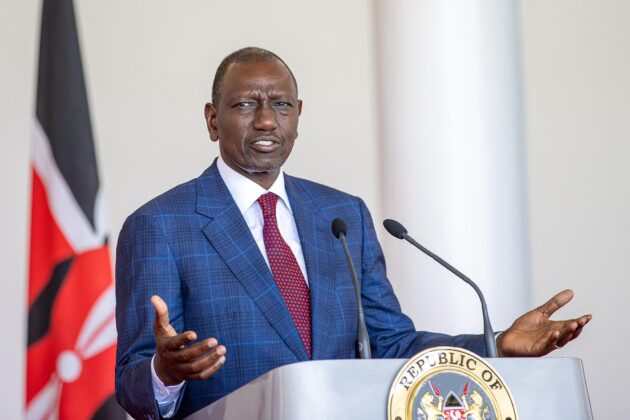
Ruto Must Go? The Real Battle Is Bigger Than One Man » Capital News
President William Ruto’s recent remarks—first declaring himself invincible, then musing that he would retire to farming if Kenyans rejected him—betray a man caught between confidence and crisis. These conflicting declarations haven’t gone unnoticed. They follow a wave of unprecedented public backlash, where chants of “Ruto Must Go” now follow him wherever he goes—loud, raw, and spontaneous.
But this isn’t mere protest. It is an uprising born of betrayal. A disillusioned generation has risen, fed up with a regime that promised transformation but delivered disappointment. This is not an opposition-led movement. There are no visible organizers, no single political space to pin it on. The fury erupts in nightclubs, football stadia, and public gatherings—anywhere a microphone or moment arises. Any politician seen to align with the regime becomes a target.
Ironically, this anger has given new life to some of the most unlikely figures. Even the former Deputy President—once a key figure in the same system—has found renewed credibility simply for criticizing the regime. The irony is not lost on Kenyans, who remember the silence of these critics when they once enjoyed the spoils of power.
And yet, amid the noise and fury, a deeper, more ominous question persists: can anyone defeat the Ruto-Raila axis?
This is no ordinary alliance. It is a coalition forged in fire, ambition, and survival—an alliance steeped in Kenya’s most defining political moments. From their rivalry during the bloody 2007 elections to the “handshake” era and now a shared stake in a broad-based government, Ruto and Raila have become the twin pillars of a power structure that has little regard for ideology and every regard for power.
The same Raila Odinga who once branded Ruto the “High Priest of Corruption” now shares political ground with him, as if Kenya’s painful history were a stage play to be re-scripted at will. Together, they exemplify what Chinua Achebe warned about in A Man of the People—a ruling elite loyal not to citizens, but to the maintenance of power itself.
Achebe’s fictional Chief Nanga was adored by the people, but beneath the charm lay corruption, entitlement, and ruthless self-preservation. Kenya today stands eerily close to this tragic fiction: a fragmented opposition, a manipulated public, and a recycled elite rotating power among themselves while masquerading as adversaries.
This is why defeating the entrenched Ruto-Raila alliance will take more than chants and outrage. It demands clarity, vision, and leadership. The anger must be organized, the energy mobilized, and the movement redefined—not merely to unseat a president, but to redirect the course of the nation.
The opposition must rise—not around personalities, but around principles. They must speak to the lived frustrations of ordinary Kenyans. That means confronting corruption, inequality, youth unemployment, and the disillusionment of a generation that sees no future in politics as usual.
But herein lies the Herculean task: Kenya’s opposition often mirrors the very regime it seeks to replace. It is riddled with ego, tribal calculations, and legacy leaders out of step with the mood of the nation. What Kenyans crave is not another populist saviour with flowery promises—they want a leader with vision, discipline, and moral clarity. One who sees beyond the next election to the next generation.
The so-called “People’s Loyal Opposition,” rising from the ashes of Azimio, must do the unthinkable: unite under a single, credible candidate and offer a coherent alternative. Not just to win, but to begin a new era—an era of accountability, inclusivity, and transformation.
If “Ruto Must Go” is to be more than a slogan, it must be backed by a strategy. The opposition must build a first-round landslide so overwhelming that no rigging machine—however sophisticated—can stand against it. Even rigging has limits. It cannot overcome a tsunami of people power united by purpose and clarity. That can only happen if egos are shelved and alliances are formed around values, not individuals.
Kenyans must demand a fresh start—not just a regime change. For if the opposition defaults to the old script of personality cults and tribal arithmetic, it will have handed Ruto and Raila a second term on a silver platter.
And yet, even as the people chant “Ruto Must Go,” they must remain alive to the sanctity of democratic process. We have the tools to transfer leadership peacefully, and we must use them.
The hour is late. The people are restless. And history is watching.
Dr. Hesbon Owila is a Media and Political Communications Researcher.